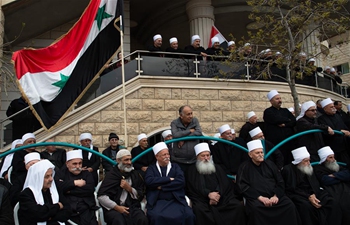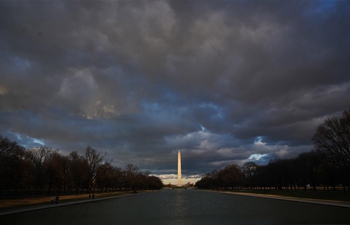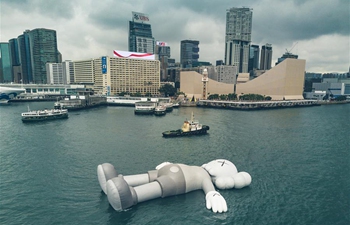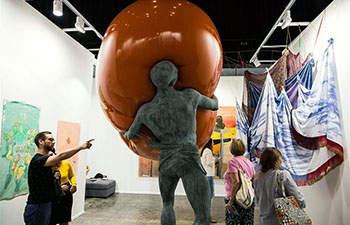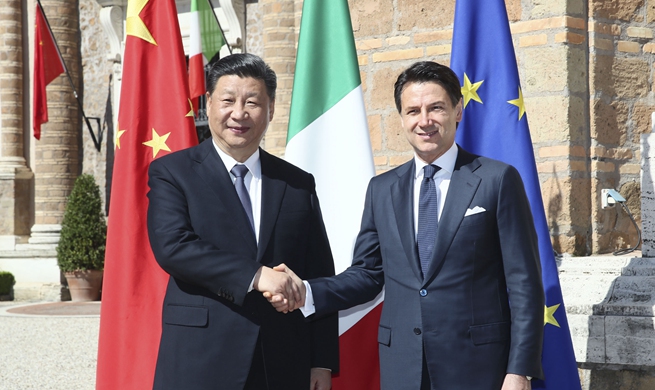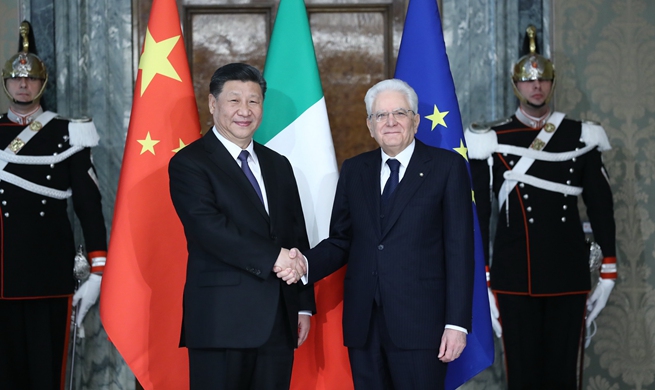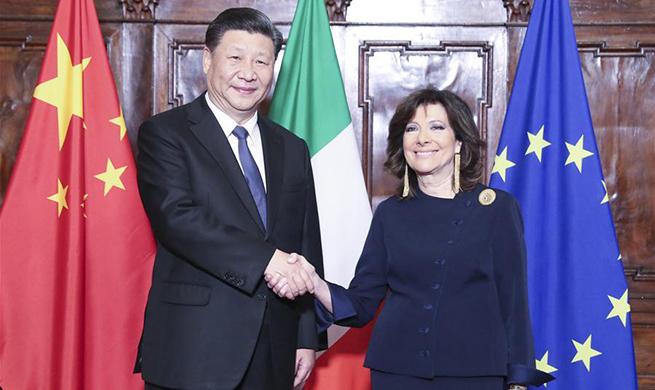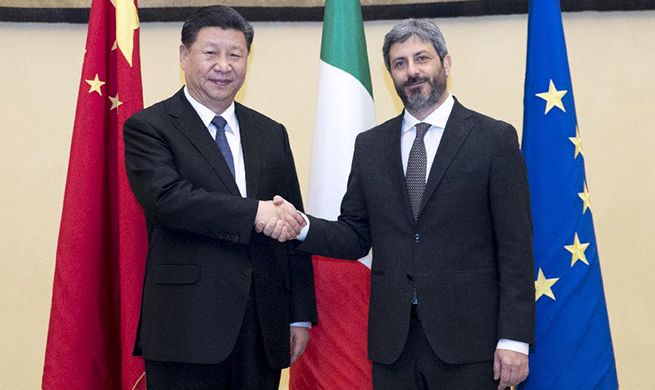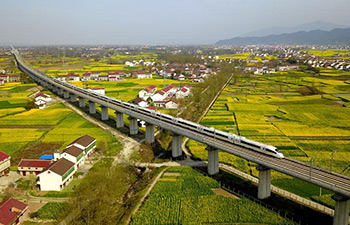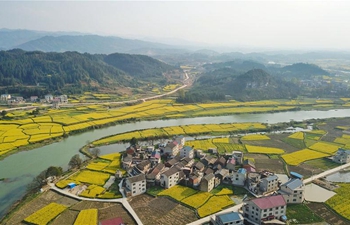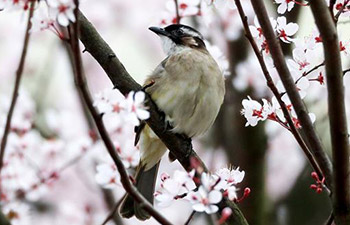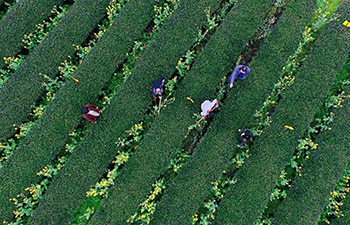ISTANBUL, March 24 (Xinhua) -- The sharp language adopted by Turkish President Recep Tayyip Erdogan in denouncing the deadly mosque shootings in New Zealand is an instance of exploitation for domestic political gain and risks damaging Turkey's interests, analysts told Xinhua.
"Catapulting the terror attack in New Zealand to the center stage of Turkish domestic politics, accompanied by implacable rhetoric against the Anzacs, President Erdogan has deeply hurt the sensibilities of the Australians and New Zealanders," said Faruk Logoglu, a former senior Turkish diplomat.
The Anzacs were soldiers serving with the Australian and New Zealand Army Corps, who as part of the Allied forces forced unsuccessfully their way through the Dardanelles in their Gallipoli campaign in 1915.
In addition, the Turkish president took the latest twin attacks on worshipping Muslims as part of an allegedly longstanding plot by the West aimed at kicking Turks out of Europe and Istanbul.
"We got your message ... You will not be able to turn Istanbul into Constantinople," Erdogan said defiantly, as Istanbul was known as Constantinople before its conquest by the Ottomans in 1453.
He then said that "your grandparents came, some returned in coffins. In case you also come, have no doubt we will send you off in the same way your grandparents were."
The president was alluding to the failed attempt by the Allied forces in the First World War to land on Gallipoli in a bid to capture Istanbul, then Ottoman capital.
The gunman who carried out the mosque attacks suggested in his manifesto that Istanbul would be taken back by the Christians and that all the mosques in the city would be destroyed.
Fifty people were killed in the attack on two mosques by the gunman, an Australian citizen, in New Zealand's Christchurch city on March 15.
Erdogan's remarks were made at a ceremony in the Canakkale province, the theater of the historic Gallipoli campaign, held on March 18 to commemorate the initial Ottoman victory over the impressively strong Allied armada.
Erdogan also showed the video footage of the brutal mosque shootings in election rallies to denounce Islamophobia.
His comments and the projection of the video footage at the rallies initially drew protests from the New Zealand and Australian governments.
"This is yet another instance where abuse of foreign policy matters for domestic political ends backfires, undermining national interests and prestige," said Logoglu.
New Zealand criticized Erdogan's attitude, saying the politicization of the terror attack would put the future and safety of the New Zealand people and New Zealanders abroad in danger.
Australian Prime Minister Scott Morrison, who summoned Turkey's ambassador on Wednesday, described Erdogan's comments as "highly offensive and reckless" and warned of a review of bilateral ties if Erdogan would not retract them.
Turkey's main opposition Republican People's Party accused Erdogan of exploiting the killings to increase his party's votes in the upcoming local elections, underlining that the use of the video footage would serve the terrorist's purposes.
Turkey is scheduled to have local elections on March 31, in which Erdogan's ruling Justice and Development Party (AKP) may lose some big cities to the opposition, according to polls.
Erdogan's attitude aims to consolidate his party's voters ahead of the elections, said Cahit Armagan Dilek, director of the Ankara-based 21st Century Turkey Institute.
"The golden rule is 'if you play politics with your foreign relations, you will lose!'," said Logoglu, adding "what Ankara must do is, therefore, quietly, humbly and respectfully to support the government and people of New Zealand in their exemplary way of handling this horrendous crisis."
Things have settled down after Erdogan's office said his comments were taken out of context.
The statement by Erdogan's office helped to avoid a disruption in bilateral ties, remarked Dilek.
However, both analysts feel that the diplomatic row, though ultimately settled, would leave a scar in Turkish ties with the two countries.
"The incident will leave Turkey's relations with New Zealand and Australia bruised for a long time to come," said Logoglu.
"Erdogan and his administration has lost credibility before the two countries enormously," Dilek remarked.
The Turkish president has long been criticized at home for abusing foreign policy for domestic political gains.
The AKP's foreign policy has been more focused on reaping benefits in domestic politics in the past decade, argued Dilek.
"Foreign policy issues must be debated in public, but on their own merits, not on the basis of partisan gains," maintained Logoglu.
Both Logoglu and Dilek think that Erdogan's approach has something to do as well with the country's ambition to act as the patron of the Islamic world.
Turkish Vice President Fuat Oktay and Foreign Minister Mevlut Cavusoglu flew to New Zealand by a presidential jet immediately after the attacks to pay respects to the victims.
The visit was aimed at creating the impression that Ankara would stand by Muslims under attack anywhere in the world, said Dilek.
Ankara's aspirations to lead, however, would not be enthusiastically received by most of the Muslim countries, as the AKP no longer has the capacity to assume a mediator role considering it has acted like a spokesperson of the Sunni sect after Syria was plunged into chaos and war in 2011, stated Dilek.
"Erdogan, ever since taking the helm of Turkey first as prime minister, now as president, has always coveted and entertained a self-proclaimed role as the leader and voice of the Muslim world," said Logoglu.
"Rather than corresponding to an actual state of affairs, this self-styled role is more for domestic consumption than anything else," he argued.
Logoglu also feels that Turkey's current chairmanship of the Organization of Islamic Cooperation (OIC) and its co-chairship with Spain of the United Nations Alliance of Civilizations give Erdogan "a measure of special responsibility to act on behalf of the Muslim world."
Turkey hosted an emergency OIC meeting in Istanbul on Friday over the New Zealand shootings, drawing foreign ministers of member states and New Zealand.

